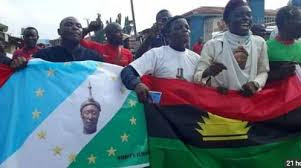Nigeria was established in 1914 by British colonial authorities, not through mutual consent but for imperial convenience. This created a sta...
Nigeria was established in 1914 by British colonial authorities, not through mutual consent but for imperial convenience. This created a state that encompasses over 250 ethnic groups, each with its own distinct cultures, religions, and political systems. The northern region is predominantly Muslim and home to the Hausa-Fulani ethnic group. At the same time, a mix of Yoruba Christians, Muslims, and traditionalists characterizes the Southwest. In the Southeast, the Igbo, primarily Christian and traditionalist, dominate. These deep-seated divisions have led to coups, civil wars, terrorism, and secessionist movements since the country gained independence in 1960.
Yet, British foreign policy has often tacitly supported Nigeria's "unity at all costs," fearing that disintegration could create a domino effect across West Africa. However, recent developments, including Burkina Faso's rejection of French influence and growing ties with Russia, show that a new world order is emerging—one in which Western powers must rethink their colonial-era loyalties and assumptions.
Burkina Faso's decision to cut military ties with France and align itself with Russia—and, by extension, the emerging BRICS+ axis—reflects a broader anti-Western sentiment growing in parts of Africa. This shift is driven by disillusionment with decades of Western-backed governments that have failed to deliver security or prosperity.
Burkina Faso, alongside Mali and Niger, has moved towards a regional alliance known as the Alliance of Sahel States (AES). These countries, bound by shared security concerns and pan-Africanist rhetoric, have sought alternatives to Western military aid and diplomacy. While some critics see this as a retreat into authoritarianism or Russian manipulation, others argue it is reclaiming sovereignty and rejecting imposed Western systems.
The lesson for Britain is clear: when a former colony chooses new allies and asserts regional independence, it must be taken seriously—not dismissed or opposed reflexively. Supporting peaceful self-determination can foster goodwill, reduce extremist ideologies born of frustration, and pave the way for new bilateral relations based on mutual respect.
In Nigeria, the British government has historically prioritized the preservation of a single state, partly for geopolitical reasons. However, Nigeria's worsening insecurity—from Boko Haram in the North to secessionist agitations in the Southeast and Southwest—suggests the country may no longer be governable as a single entity. Ethnic groups like the Biafrans, Oduduwa Yoruba nationalists, and even Middle Belt minorities are increasingly demanding autonomy or outright independence.
A peaceful restructuring or disintegration of Nigeria—like the USSR, Yugoslavia, or Sudan could stabilize the region in the long run. Smaller, more ethnically cohesive states could manage their resources more efficiently, foster democratic competition, and reduce the ethnic and religious strife that plagues the central government.
Firstly, Facilitating Dialogue: Encouraging open discourse between Nigeria's ethnic nationalities through neutral platforms.
Secondly, Supporting Referendum: As was done in South Sudan, Britain could advocate for internationally monitored referenda in regions with persistent secessionist demands.
Thirdly, Economic Transition Assistance: Assisting breakaway states with economic frameworks and bilateral agreements post-disintegration.
Fourthly, Avoiding Militarization: Opposing military crackdowns on separatist movements and pushing for diplomatic solutions.
If Britain fails to engage constructively, other global powers—Russia, China, and even Turkey—will fill the vacuum. Nigerian secessionist groups are already reaching out to foreign powers for support, seeing no hope in the current political system. The potential for radicalization increases when peaceful avenues for self-determination are closed.
Britain must understand that its legacy in Africa is at a turning point.
Supporting oppressive central governments in the name of unity is risky. Britain can redefine its role as a post-colonial power—not as a neo-imperial force, but as a partner in Africa's true independence.
In Conclusion,
Burkina Faso's realignment with Russia is a wake-up call for former colonial powers. The age of forced unity is ending. Nigeria's complex fault lines are no longer sustainable under a centralized system that ignores the will of its people. Britain must abandon its outdated commitment to Nigeria's territorial integrity and support a peaceful reconfiguration of the country, embracing a future where multiple sovereign states can thrive on their own terms. This is a moral obligation and a strategic necessity in a rapidly changing global order.
Written by
Anthony B
Edited by
Oby M
For Lagos State Media Team













No comments